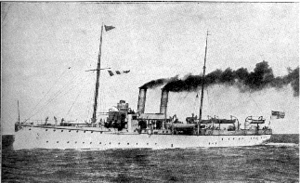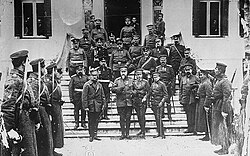Agadir Crisis
| Agadir Crisis | |||||||||
|---|---|---|---|---|---|---|---|---|---|
| Part of the causes of World War I | |||||||||
 SMS Panther in the Bay of Agadir | |||||||||
| |||||||||
| Belligerents | |||||||||
|
| |||||||||
| Commanders and leaders | |||||||||
|
| ||||||||
| Events leading to World War I |
|---|
 |
|
The Agadir Crisis, Agadir Incident, or Second Moroccan Crisis was a brief crisis sparked by the deployment of a substantial force of
In
Background
France's pre-eminence in Morocco had been upheld by the 1906 Algeciras Conference, following the First Moroccan Crisis of 1905–06. France and Germany agreed on 9 February 1909 that while France would have exclusive political control, the two nations would uphold each other's economic interests in Morocco.[4] In 1911 they forced the sultan to sign a new treaty wherein he promised not to sign any other treaties without French approval,[5] arguably violating the earlier made agreements.
Germany's move was aimed at testing the relationship between Britain and France, and possibly intimidating Britain into an alliance with Germany.[6] Germany was also enforcing compensation claims for acceptance of effective French control of Morocco.
Events
Moroccan Rebellion
In 1911, a rebellion broke out in
On 1 July, the German gunboat SMS Panther arrived at the port of Agadir, under the pretext of protecting German trade interests. The larger Bremen-class cruiser SMS Berlin came days later, replacing the gunboat.[12] A German civilian, Hermann Wilberg, 110 kilometres (70 mi) to the north, was sent south to Agadir to provide a pretext for the arrival of the Panther, but he only reached Agadir three days after the ship had arrived.[13] There was an immediate reaction from the French and the British.
German financial crisis
In the midst of this crisis, Germany was hit by financial turmoil. The stock market plunged by 30 percent in a single day,[14] the public started cashing in currency notes for gold, and there was a run on the banks. The Reichsbank lost a fifth of its gold reserves in one month. It was rumored that the French finance minister had orchestrated this crisis.[14] Faced with the possibility of being driven off the gold standard, the Kaiser backed down and let the French take over most of Morocco.[15]
Negotiations
On 7 July, the German ambassador in Paris informed the French government that Germany had no territorial aspirations in Morocco, and would negotiate for a French protectorate on the basis of "compensation" for Germany in the French Congo region and the safeguarding of her economic interests in Morocco. The German terms, as presented on 15 July, while containing an offer to cede the northern part of Kamerun and Togoland, demanded from France the whole of the French Congo from the Sangha River to the sea, to which was later added the transfer of France's right to the preemption of the Belgian Congo.
On 21 July, David Lloyd George delivered a speech at the Mansion House, London in which he declared that national honour was more precious than peace: "If Britain is treated badly where her interests are vitally affected, as if she is of no account in the cabinet of nations, then I say emphatically that peace at that price would be a humiliation intolerable for a great country like ours to endure."[16] The speech was interpreted by Germany as a warning that she could not impose an unreasonable settlement on France.[17]
On 4 November, secret Franco-German negotiations between
French premier Caillaux's negotiations with the Germans were leaked, causing him to fall from office on 21 January 1912, after a term of only seven months.[19] In Germany, the Franco-German accord was also criticised – especially by the nationalist press – for giving Germany too little.[19]
British involvement
The initial reaction in
The prospect of a German naval port on the Atlantic, however, allowed Grey to secure Cabinet's approval on 21 July to inform the German ambassador that Britain would respond forcefully to defend its interests. Britain sent battleships to Morocco, in case war broke out. As in the First Moroccan Crisis, British support of France showed the strength of the Entente Cordiale.[20]
Divisions, however, became clear between the supports of the entente (Grey,
Aftermath

One consequence of the crisis was that the French viewed German policy as motivated by bluff: Raymond Poincaré, the premier succeeding Caillaux in early 1912, observed that 'whenever we have adopted a conciliatory approach to Germany... she has abused it; on the other hand, on each occasion when we have shown firmness, she has yielded', drawing the conclusion that Berlin would only understand a forceful response.[23]
American historian Raymond James Sontag argued in 1933 that it was a comedy of errors that became a tragic prelude to the First World War:
- The crisis seems comic – its obscure origin, the questions at stake, the conduct of the actors – indeed was comic. But the results were tragic. Tensions between France and Germany and between Germany and England have been increased; the armaments race received new impetus; the conviction that an early war was inevitable spread through the governing class of Europe.[24]
With
This incident led Britain's
The crisis led Britain and France to conclude a secret naval agreement by which the Royal Navy promised to protect the northern coast of France from German Navy attack, while France concentrated her fleet in the western Mediterranean and agreed to defend British interests there. France was thus able to guard her communications with her North African colonies, and Britain to concentrate more force in home waters to oppose the German High Seas Fleet.[27] Britain also formed a Railway Executive Committee in order to rapidly mobilize in the event of a continental war.[28]
German world historian Oswald Spengler was inspired by the episode to write his The Decline of the West. "The Agadir crisis of 1911, which suddenly raised the specter of a general European war and strikingly revealed the danger of Germany's encirclement by the Entente, crystallized Spengler's nascent vision of the future international political transformation of the West."[29]
During the First World War, in 1916, Neukamerun returned to France. The territory today forms part of Chad, Central African Republic, the Republic of the Congo, and Gabon.[30] Established in 1912, the French protectorate in Morocco lasted until 1956.[31]
See also
- Causes of World War I
- First Moroccan Crisis
- International relations (1814–1919)
- Pact of Cartagena
- Anglo-German naval arms race
- French–German enmity
References
- ^ "Agadir Incident | European history". Encyclopedia Britannica. Retrieved 12 April 2021.
- ^ OCLC 1002090920.
- ^ Clark 2013, pp. 204–213.
- ^ Clark 2013, p. 196.
- ^ GP XXIX, number 140, Affaires du Maroc VI, 332 ff
- ISBN 0-671-51099-1.
- ^ a b Clark 2013, p. 195.
- ^ Clark 2013, p. 204.
- ^ Fay (1930) 278-284.
- ^ Affaires du Maroc VI, 372 ff
- ^ Clark 2013, p. 207.
- ^ MacMillan, Margaret (2013). The War that Ended Peace: The Road to 1914. Random House. p. 439.
- ^ MacMillan, Margaret (2013). The War that Ended Peace: The Road to 1914. Random House. p. 440.
- ^ ISBN 978-0-09-949308-2.
- ISSN 2393-1795.
- ^ Clark 2013, p. 209–10.
- S2CID 159528772.
- ^ Maurice, Zimmermann (1912). "L'accord franco-allemand du 4 novembre 1911 au sujet du Maroc et du Congo". Annales de géographie (in French). 21 (116).
- ^ a b Clark 2013, p. 208.
- ^ a b c Clark 2013, p. 209.
- ^ Quoted in M.L. Dockrill, British Policy During the Agadir Crisis of 1911 from F.H. Hinsley, British Foreign Policy Under Sir Edward Grey (Cambridge, 1977), p. 271.
- ^ Clark 2013, pp. 210–212.
- ^ Clark 2013, pp. 208–9.
- OCLC 45825411.
- OCLC 560333488.
- ISBN 0-671-79932-0. p. 11-12, pp. 153-154
- JSTOR 40107237.
- )
- OCLC 462269293.
- ^ Neba 4–5.
- ^ "Morocco | History, Map, Flag, Capital, & Facts". Encyclopedia Britannica. Retrieved 12 April 2021.
Further reading
- Anderson, Frank Maloy and Amos Shartle Hershey, eds. Handbook for the Diplomatic History of Europe, Asia, and Africa 1870-1914 (1918) online, brief summary
- Barlow, Ima Christina. The Agadir Crisis (University of North Carolina Press, 1940).
- Barraclough, Geoffrey. From Agadir to Armageddon: anatomy of a crisis (1982). online
- Colonialism: An International Social, Cultural, and Political Encyclopedia. ABC-CLIO. 2003. p. 8. ISBN 9781576073353.
- Brandenburg, Erich. (1927) From Bismarck to the World War: A History of German Foreign Policy 1870-1914 (1927) online.
- Carroll, E. Malcolm, French Public Opinion and Foreign Affairs 1870-1914 (1931). online pp 231–51.
- Carroll, E. Malcolm. Germany and the great powers, 1866-1914: A study in public opinion and foreign policy (1938) online [ISBN missing], pp 643–99
- Clark, Christopher. Sleepwalkers: How Europe Went to War in 1914 (2012), pp 204–14. online
- Fay, Sidney Bradshaw. The Origins of the World War (Vol. 1. Macmillan, 1930) pp 277–293. online
- Gooch, G.P. History of modern Europe, 1878-1919 (2nd ed. 1956) pp 386–413. online, diplomatic history
- Marder, Arthur. From the Dreadnought to Scapa Flow: Volume I: The Road to War 1904–1914 (Oxford UP, 1961) pp 239–246, the role of British Royal Navy
- Nicolson, Harold. King George V (1953) pp 177–193. online
- Somervell, D.C. The Reign of King George V, (1936) pp 229–38.online free
- Spender, J.A. Fifty years of Europe: a study in pre-war documents (1933) pp 329–40.
- Wilson, Keith. "The Agadir Crisis, the Mansion House Speech, and the Double-Edgedness of Agreements." Historical Journal 15#3 (1972): 513–532.
